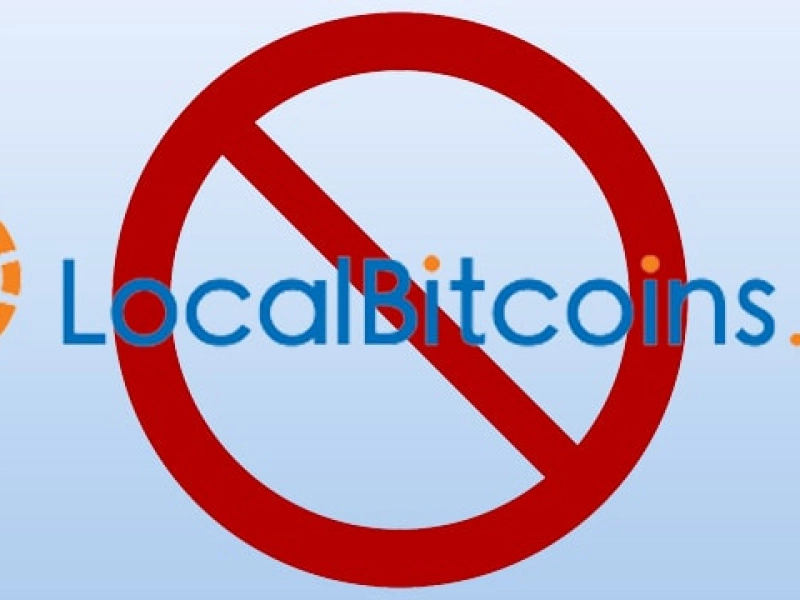Failed at AML? Why LocalBitcoins shut down after 10 years of operation
On February 9, 2023, major cryptocurrency P2P platform LocalBitcoins announced that it was suspending its operations.
"We regret to inform you that despite our efforts to overcome the challenges of the current, very cold crypto winter, we have concluded that LocalBitcoins can no longer provide bitcoin trading services," the site administration said in a statement.
Currently, registration of new users has been stopped. February 16, trading operations will be stopped. From February 17, users will only be able to withdraw their funds from the exchange wallets, this feature will be available for 12 months.
Who are LocalBitcoins?
LocalBitcoins, registered in Helsinki, has been operating since 2012 as a platform for P2P cryptocurrency transactions around the world. A user could deposit cryptocurrency on the platform and sell it to another user for fiat money, which was transferred off-site (OTC - over the counter) in any way convenient for the transaction participants. This popular method to convert cryptocurrency into fiat money can be found on any major exchange (Binance, Huobi, etc.).
At one time, the site's founder Jeremias Kangas stated in an interview with Bitcoinist that LocalBitcoins provides users with "increased privacy" because it does not require any identification. Until 2019, the service even allowed users to buy and sell bitcoins for cash in a face-to-face meeting. Not surprisingly, LocalBitcoins ended up being a magnet for illegally earned cryptocurrency. According to blockchain analytics, more than 60,000 BTC (about 100 billion rubles) from the darknet marketplace Hydra have passed through the platform in total during its operation. This is less than 1% of the service's total turnover, but the amount is still significant: it turns out that LocalBitcoins was the largest counterparty to the illegal marketplace.
In 2020, LocalBitcoins' dubious transactions became public - the analytics company CipherTrace devoted a whole chapter to them in its report on cryptocrime and money laundering. The platform's administration drew conclusions and tightened its AML and KYT policies, after which users began to complain en masse about blocking accounts without warning. On the one hand, due to this it was possible to avoid the closure of the site by law enforcement agencies. On the other hand, it drove some customers away from LocalBitcoins.
The competitors did not slumber either - other big players were entering the P2P market. In 2019, the Binance exchange launched its P2P section, offering clients more favorable terms. LocalBitcoins charges a 1% commission for placing ads to buy or sell cryptoassets on its platform, while Binance's commission, depending on the specific currency, ranges from 0 to 0.35%.
As a result of these factors, LocalBitcoins began to rapidly lose market share: while in 2019 the site's turnover exceeded $50 million per week, by 2022 the figure had dropped almost 10-fold. At the end of 2022, rumors of the company's imminent bankruptcy emerged. And, apparently, they weren't just rumors.
Conclusions
There are no comments from law enforcement agencies about the situation around LocalBitcoins yet, so we can't talk about forced closure of the site. Time will tell if the service from Finland will be able to settle accounts with all its customers, or will try to withdraw funds and turn out to be another "scam".
The most likely reason for the closure of LocalBitcoins is seen as the company's inability to adapt to the tightening requirements of anti-money laundering and countering the financing of terrorism (AML/CFT) legislation. Initially, its business model was based on anonymous (i.e. without KYC procedures) access to the platform and decentralized exchange. Customers who valued anonymity were willing to pay fees at higher rates. The attempt to restructure the business model under the new rules led to an outflow of clients to competitors offering more favorable financial terms, and a drop in turnover.
It is now clear that it is dangerous to build a cryptocurrency business without complying with customer verification (KYC) and transaction verification (KYT) regulations, and these conditions should be built into the business model from the beginning. It's getting harder to operate in the market, the days of "true crypto-anarchists" are becoming a thing of the past. Regulation is tightening, competition is growing, and the ability to adapt to changing conditions is the key to survival in the market. On the other hand, the cryptocurrency market is becoming more civilized, bringing closer the moment of official recognition of cryptocurrencies as a convenient, high-tech financial instrument of the future.
- Bloomberg: U.S. regulator launches investigation into Binance USD, a stablecoin issuer
- UK will give up to 2 years for illegal crypto-advertising
- Visa conducted a trial launch of payments in stablecoins in the SWIFT system
- Binance will raise withdrawal fees
- "IRON, Paper, Scissors. How to choose a cold cryptocurrency wallet
- Cryptoservice LocalBitcoins announced its closure
- Dubai bans anonymous cryptocurrency issuance and transactions
- Kraken exchange shut down stacking in the U.S. and will pay a $30 million fine there




_410x245_00e.webp)


